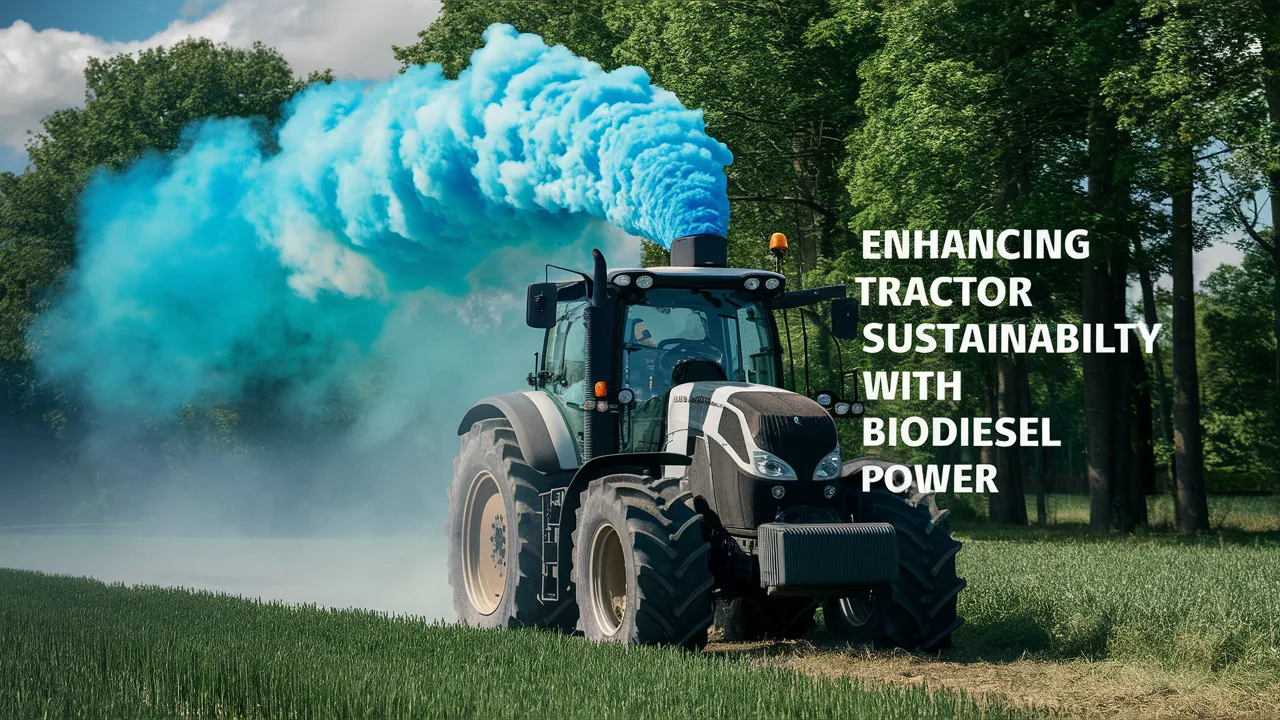In recent years, there has been a discernible surge in the quest to enhance tractor sustainability through the utilization of biodiesel power. This growing interest reflects a paradigm shift within the agricultural realm towards more environmentally conscious practices.
As farmers, agricultural engineers, environmental scientists, and biofuel researchers delve deeper into the potential of alternative fuels like biodiesel, the significance of transitioning from traditional diesel becomes increasingly apparent.
Such a transition not only aligns with the ethos of sustainable agriculture but also paves the way for innovation and progress in fueling farming operations.
The quest for improved tractor sustainability underscores a fundamental necessity—finding viable alternatives to traditional fossil fuels. Biodiesel emerges as a promising contender in this journey towards sustainability due to its renewable nature and reduced carbon footprint compared to conventional diesel counterparts.
By exploring the integration of biodiesel into agricultural machinery such as tractors, stakeholders aim to cultivate a greener future while enhancing operational efficiencies in farm settings.
This article delves into the intricate facets of leveraging biodiesel power within tractor operations, shedding light on its benefits, challenges, economic implications, and pivotal role in fostering a harmonious balance between agricultural productivity and ecological responsibility.
For those impassioned by sustainable farming practices and seeking to navigate the complexities of biofuel adoption efficiently, this exploration promises valuable insights tailored to propel tractor sustainability forward.
Understanding Biodiesel Power.
Biodiesel is a renewable fuel derived from natural oils, animal fats, or recycled cooking grease through a process called transesterification. It serves as a sustainable alternative to traditional diesel, offering advantages like lower emissions and decreased reliance on non-renewable fossil fuels.
One of the key characteristics of biodiesel is its compatibility with existing diesel engines without requiring significant modifications. This compatibility extends to both old and new tractor models, making it a versatile option for farmers looking to reduce their carbon footprint while maintaining operational efficiency.
When comparing traditional diesel and biodiesel, the environmental benefits of the latter become apparent. Biodiesel typically produces lower levels of harmful pollutants such as sulfur oxides and particulate matter, contributing to improved air quality in agricultural settings.
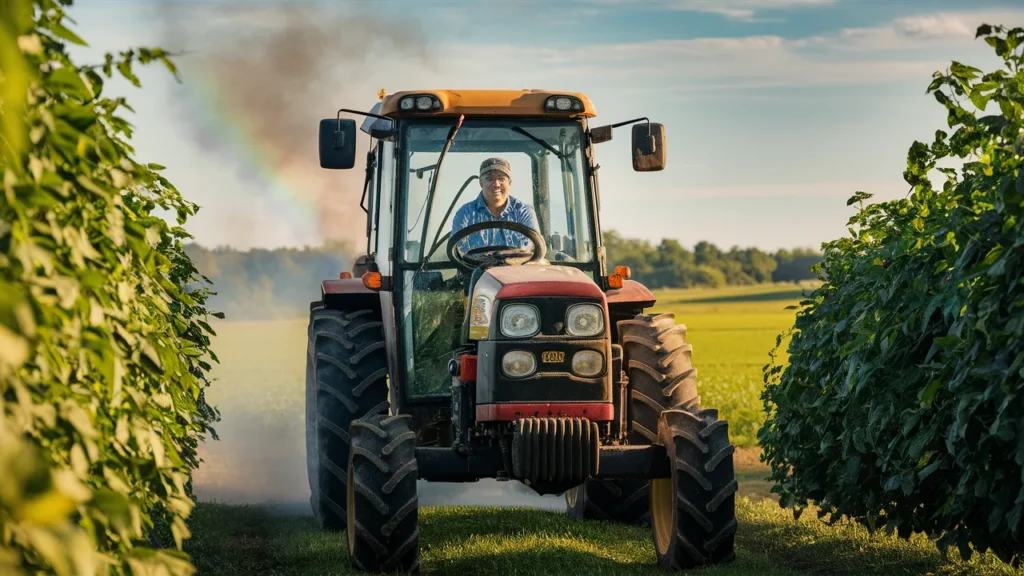
Additionally, the production process for biodiesel often involves utilizing waste materials or crops specifically grown for biofuel purposes, further reducing the strain on finite resources like crude oil. In terms of efficiency, biodiesel boasts similar energy content to conventional diesel fuel while outperforming it in lubricity and flash points—key factors in engine performance and longevity.
The shift towards biodiesel represents a strategic choice for farmers seeking to align their operations with sustainable practices. By using biodiesel instead of traditional diesel in tractors, farmers can significantly decrease their carbon footprint and contribute positively to environmental conservation efforts.
Moreover, the reduced dependence on fossil fuels helps enhance energy security by diversifying fuel sources within the agricultural sector. Overall, embracing biodiesel power offers multifaceted benefits that go beyond environmental concerns, shaping a more resilient and efficient farming landscape for current and future generations alike.
Engine Compatibility and Performance.
When transitioning tractor operations to biodiesel power, one crucial aspect is assessing the compatibility of existing engines with this alternative fuel source.
Biodiesel, composed of fatty acid methyl esters (FAME) derived from renewable resources like vegetable oils or animal fats, possesses similar characteristics to traditional diesel but requires specific considerations due to its different composition.
Tractor manufacturers are increasingly offering models designed to run efficiently on biodiesel blends while ensuring long-term engine health.
To optimize tractor performance when using biodiesel, certain engine modifications might be necessary. Factors such as adjusting fuel injection timing and potentially upgrading fuel filters can enhance combustion efficiency and prolong engine life.
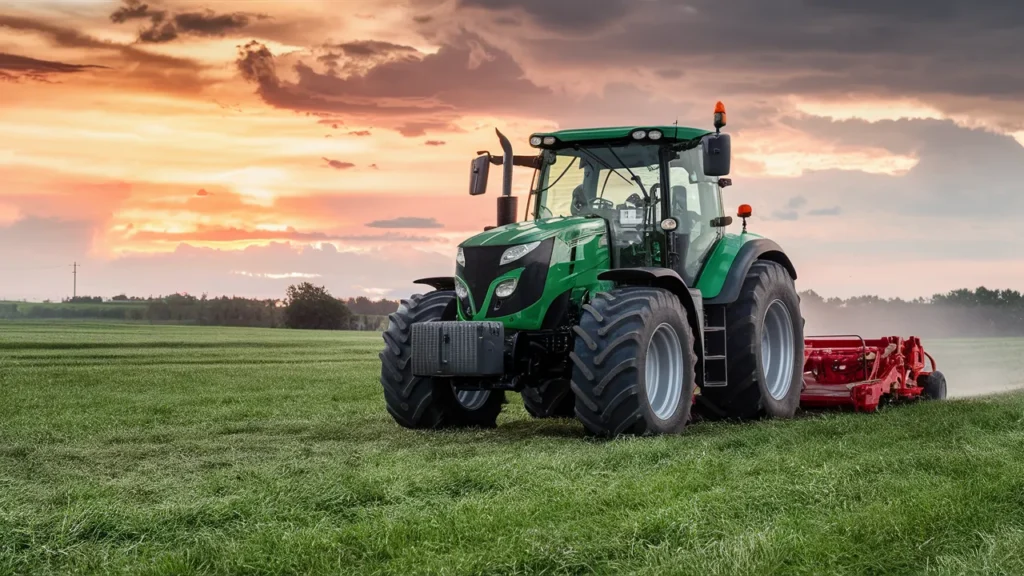
Proper maintenance procedures become paramount to mitigate any detrimental effects on engine components that may arise from using biodiesel blends, safeguarding overall performance metrics like power output and fuel efficiency.
Studies have shown that when managed appropriately, biodiesel does not significantly impact engine longevity and can even provide lubrication benefits due to its higher oxygen content compared to traditional diesel.
Engine wear can be reduced through the use of biodiesel, contributing positively to operational costs in the long run. By understanding the intricacies of how biodiesel interacts with tractor engines and implementing proper maintenance measures, farmers can harness the full potential of this sustainable fuel source without compromising performance or durability.
Environmental Impact Assessment.
When evaluating the environmental impact of biodiesel in powering tractors, it is vital to consider the significant benefits it offers towards sustainability. Biodiesel, derived from renewable resources like vegetable oils or animal fats, has been shown to produce significantly lower greenhouse gas emissions compared to traditional diesel fuels.
By utilizing biodiesel in tractor operations, farmers can actively reduce their carbon footprint and contribute to combating climate change on a local and global scale. This reduction in emissions not only aligns with environmental regulations but also showcases a commitment towards sustainable agricultural practices.
Comparing the greenhouse gas emissions between biodiesel-powered tractors and those running on conventional diesel further emphasizes the positive impact of biodiesel utilization. Studies have consistently shown that biodiesel significantly lowers carbon dioxide, sulfur dioxide, and other harmful pollutants released into the atmosphere during agricultural activities.
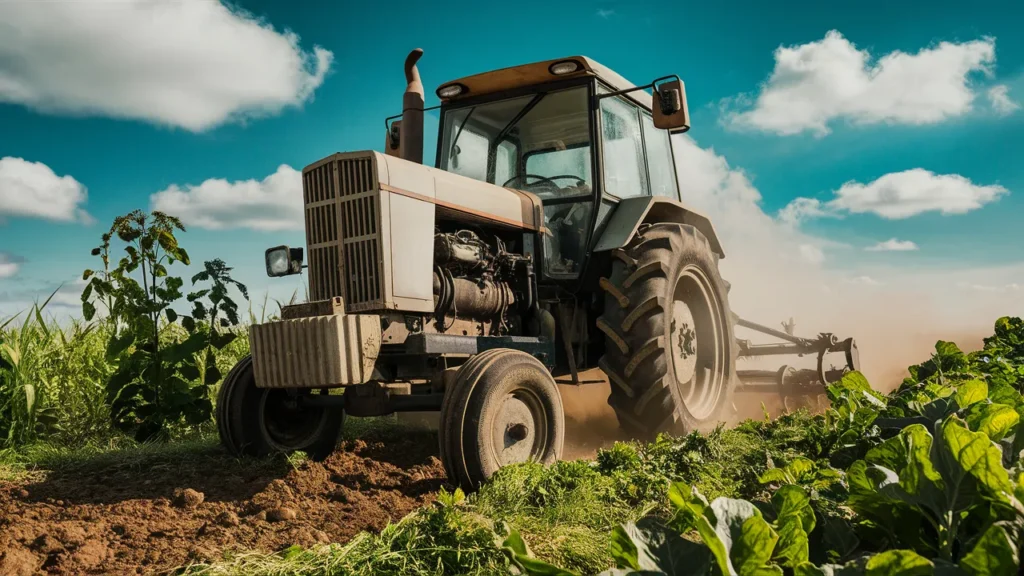
This reduction not only improves air quality but also minimizes the tractor’s contribution to environmental degradation. As agriculture plays a significant role in worldwide emissions, integrating biodiesel into farming practices becomes imperative for creating a more sustainable ecosystem.
Integrating biodiesel as a primary fuel source for tractors goes beyond emission reductions; it fosters a more sustainable farming ecosystem holistically. Not only does this alternative fuel minimize pollutants released directly into the environment, but it also promotes a closed-loop system where waste products can be recycled back into energy production efficiently.
The use of biodiesel in tractors sets a precedent for environmentally conscious practices within the agricultural sector, encouraging other industries to explore similar sustainable solutions.
Ultimately, by embracing biodiesel power for tractors, farmers are not just reducing their ecological footprint but actively participating in creating a greener future for agriculture and beyond.
Economic Considerations.
In assessing the economic feasibility of transitioning to biodiesel for tractor operations, farmers are increasingly drawn to the potential long-term financial benefits and sustainability offered by this alternative fuel source.
While the initial costs of implementing biodiesel-compatible machinery and infrastructure may pose a barrier, a comprehensive cost comparison between traditional diesel fuel and biodiesel production/use reveals compelling advantages.
Notably, despite fluctuations in crude oil prices impacting traditional diesel costs, biodiesel production can be more stable due to its renewable nature, potentially providing farmers with a more predictable and sustainable energy source.
When evaluating the long-term financial benefits for farmers who adopt biodiesel as their primary fuel source for tractor operations, it becomes evident that the reduced dependence on fossil fuels can lead to significant cost savings over time.
By mitigating exposure to volatile oil markets and potentially lower fuel prices associated with biodiesel compared to traditional diesel, farmers stand to achieve greater financial stability.
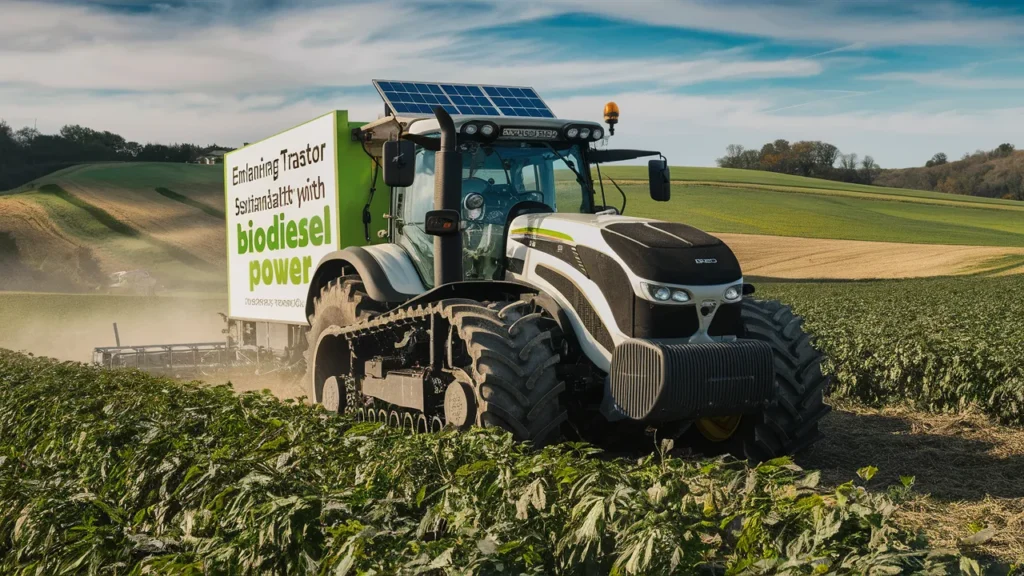
Furthermore, considering the environmental benefits of using biodiesel which might result in eligibility for incentive programs or grants further enhances the economic appeal of this sustainable energy option.
An illustrative example showcasing the economic advantages of transitioning to biodiesel involves a case study where a farm introduced biodiesel-powered tractors into their operations. Over a designated period, they recorded substantial savings on fuel expenses while also benefiting from reduced maintenance costs associated with cleaner-burning fuels like biodiesel.
These financial gains translated directly into increased profitability for the farm, underlining how adopting biodiesel not only supports environmental goals but also contributes positively to the economic bottom line in agricultural practices.
Agricultural Sector Trends.
Within the agricultural sector, a noticeable shift is occurring towards the widespread adoption of sustainable energy solutions like biodiesel to power tractors and farm machinery. Farmers and agricultural engineers are increasingly recognizing the importance of reducing carbon footprints and embracing eco-friendly practices.
This trend is not only driven by the environmental benefits but also by the economic advantages that can be reaped in the long run by transitioning to biofuels. By incorporating biodiesel into their operations, farmers are aligning with global sustainability goals while ensuring efficient farm management practices.
Case studies across various farming operations have highlighted the successful integration of biodiesel-powered tractors. For instance, a family-owned organic farm in California reported significant reductions in greenhouse gas emissions after switching to biodiesel for their tractors.
The improved air quality and reduced environmental impact positively impacted crop yields and overall farm productivity. Such real-world examples serve as testimonials for other farmers looking to make similar transitions toward more sustainable energy sources within their operations.

Looking ahead, predictions indicate that advancements in utilizing biofuels within the agricultural industry will continue to evolve rapidly. Research initiatives focusing on enhancing the efficiency of biodiesel production methods, optimizing engine performance with biofuel blends, and exploring novel applications of bioenergy in agriculture are expected to drive innovation in this space.
As government incentives and policies further support the growth of sustainable energy solutions, including biofuels, it is anticipated that more farms worldwide will follow suit in adopting biodiesel-powered tractors as a standard practice for achieving enhanced tractor sustainability while contributing to a greener agricultural landscape globally.
Practical Implementation Steps.
Implementing biodiesel into tractor operations requires a systematic approach to ensure seamless integration and optimal performance. Here is a step-by-step guide for farmers looking to transition to biodiesel as a sustainable fuel source for their tractors:
1. **Assessment of Tractor Compatibility**: Begin by determining the compatibility of your tractor with biodiesel. Consult your equipment manual or manufacturer to confirm if your tractor is suitable for biodiesel blends. Modern tractors are usually designed to operate with biodiesel up to B20 (20% biodiesel, 80% diesel), while older models may require modifications.
2. **Sourcing Quality Biodiesel Fuel**: To ensure efficient operation and minimize engine issues, it’s crucial to source high-quality biodiesel fuel from reputable suppliers tailored to agricultural needs. Look for suppliers that adhere to industry standards and provide pure biodiesel without contaminants that could harm the engine.
3. **Regular Maintenance Checks**: Conduct regular maintenance checks specific to using biodiesel in tractors. Monitor filters, hoses, and seals for any signs of wear or clogging due to biodiesel’s solvent properties. Additionally, consider working with a mechanic familiar with biodiesel engines to perform routine inspections and address any potential issues promptly.
By following these steps diligently, farmers can smoothly transition to using biodiesel in their tractors, promoting sustainability in agricultural practices while ensuring the longevity and efficiency of their equipment.
Addressing Common Challenges.
When transitioning to biodiesel for tractor operations, farmers may encounter common challenges that require proactive strategies for successful implementation. One prevalent issue is maintenance concerns due to the different chemical composition and properties of biodiesel compared to traditional diesel fuel.
Biodiesel has solvent properties that can loosen accumulated deposits in fuel lines and storage tanks, potentially leading to clogged filters and injectors. To address this, regular inspections and maintenance schedules need to be established, emphasizing filter checks, tank cleaning procedures, and engine component evaluations specific to biodiesel use.
Another challenge faced by farmers looking to adopt biodiesel is the availability of quality fuel sources tailored to agricultural needs. Ensuring a consistent and reliable supply chain of biodiesel is crucial for uninterrupted tractor operations on farms.

Lack of access to trustworthy suppliers or variations in fuel quality can impact engine performance and efficiency. Farmers can mitigate this challenge by establishing partnerships with reputable biofuel producers or cooperatives specializing in supplying high-quality biodiesel suited for agricultural machinery.
Furthermore, compatibility issues between certain older tractor models and biodiesel blends can hinder a seamless transition. Engine modifications may be necessary to optimize performance when using biodiesel fuels with higher viscosity or lower cold flow properties than standard diesel.
However, retrofitting engines can incur additional costs and downtime if not planned meticulously. Farmers should consult with agricultural engineers or mechanics experienced in biodiesel conversions to assess the feasibility of modifications required for their specific tractor models while minimizing disruptions during the adaptation process.
In conclusion, addressing these common challenges requires a combination of preventive maintenance protocols, strategic partnerships with reliable biofuel suppliers, and informed decision-making regarding engine compatibility adjustments.
By proactively tackling these obstacles associated with switching to biofuel options like biodiesel, farmers can effectively enhance tractor sustainability while ensuring operational continuity and efficiency in their agricultural practices.
Future Developments in Biodiesel Technology.
As the agricultural industry continues to prioritize sustainability, researchers and engineers are actively working on advancements in biodiesel technology that could revolutionize tractor operations. One exciting area of research involves exploring new feedstocks for biodiesel production.
Algae, for example, shows great promise as a sustainable source of biodiesel due to its rapid growth rate and minimal land requirements. Innovations in algae-based biodiesel could lead to significant improvements in fuel efficiency and environmental impact compared to traditional fossil fuels.
Another future development gaining traction is the concept of second-generation biodiesels. These advanced biofuels are derived from non-food sources like waste oils, agricultural residues, or dedicated energy crops.
By utilizing these alternative feedstocks, second-generation biodiesels can address concerns related to food security and land use changes while still providing an efficient and eco-friendly fuel source for tractors.

Furthermore, ongoing research aims to enhance the properties of these biofuels through improved processing techniques and additives for better engine compatibility and performance.
Additionally, emerging technologies such as microbial biosynthesis offer a glimpse into the future of biodiesel production. Scientists are exploring genetically engineered microorganisms capable of producing biodiesel precursors directly from biomass without the need for complex chemical processes.
This innovative approach not only streamlines the production process but also has the potential to significantly reduce costs associated with traditional biodiesel manufacturing.
By continually pushing the boundaries of biofuel technology, experts are paving the way for a more sustainable future where tractor operations can be powered by efficient, environmentally friendly fuels like never before.
In conclusion, as research progresses and technological innovations unfold, the future of biodiesel technology holds immense promise for enhancing tractor sustainability on a global scale.
By staying at the forefront of these developments and embracing cutting-edge solutions, farmers and agricultural professionals can look forward to increasingly efficient, cost-effective, and eco-friendly ways to power their tractors while minimizing their environmental footprint.
Conclusion.
In conclusion, the adoption of biodiesel in tractor operations offers a significant potential to enhance sustainability within the agricultural sector. By utilizing biodiesel, farmers can achieve a crucial balance between economic viability, environmental considerations, and technological advancements.
The key advantages of implementing biodiesel power in tractors include reduced emissions, decreased dependency on fossil fuels, and a positive impact on overall engine longevity and performance metrics.
Moreover, the transition to biodiesel contributes to creating a more sustainable farming ecosystem by lowering greenhouse gas emissions compared to traditional diesel-powered tractors.
The utilization of biodiesel not only aligns with global trends promoting sustainable energy practices but also presents long-term financial benefits for farmers. As the agricultural sector continues to evolve towards greater sustainability, integrating biodiesel into tractor operations emerges as a pragmatic and forward-thinking solution.
Moving forward, ongoing advancements in biofuel technologies hold promise for further optimizing tractor sustainability and fostering environmentally conscious practices within the agricultural industry.
By staying abreast of these developments and strategically implementing biodiesel solutions, farmers can drive positive change while enhancing operational efficiency and reducing their environmental footprint.




